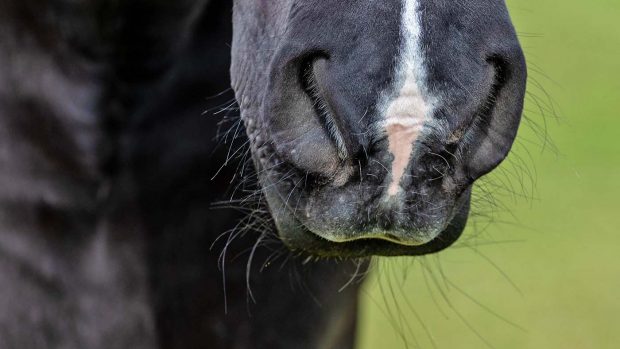WALKING over ground and raised poles can be beneficial for horses in rehabilitation or as general strengthening work, research has highlighted.
A team originally from the former Animal Health Trust found that using poles can help achieve many key rehab goals set out by veterinary and musculoskeletal practitioners for horses. These include increasing the limbs’ range of movement, strengthening musculature and improving balance and coordination.
The study, published in the Journal of Equine Veterinary Science, concludes by stating: “These findings add to the growing evidence base regarding exercise interventions for the rehabilitation of the horse and provide clinically relevant observations which practitioners can use to inform their exercise selection for individual cases.”
Rachel Murray, the senior author, told H&H the study involved 41 horses, all assessed as clinically sound and with experience of walking over poles. Each horse wore several sensors to assess its movement when walked, in hand, over ground and raised poles.
“There have been projects looking at trotting over poles but not on walking, and walking is what you use in rehab,” Dr Murray said. “In trot, horses can be bouncing off their tendons, but in walk, you’re asking them to use their muscles.”
Dr Murray likened the difference to running or walking up stairs; the former may make someone breathless and feel like more effort but the muscles may not be working as they have to in walk.
“We found horses walked differently on the ground, to walking over ground poles, and to walking over raised poles,” she said. The study found the polework increased range of movement in front- and hindlimbs, and increased the swing phase flexion in all legs.
“They bent their joints more and rounded their backs,” Dr Murray said, adding that the benefits are not only for horses in rehab – using polework is “very useful for strength”.
“Our dressage horses, who compete up to international level, walk over poles twice a week,” she said. “A lot of my clients use it as strength training, and that’s up to Paralympic and Olympic horses. You’re making the horse stronger without putting lots of strain on its legs.”
Dr Murray added that it is important to start with ground poles and raise them once strength has improved, to avoid the horse compensating by moving its back or pelvis in a less beneficial way.
“We don’t want people to think the best thing is to walk a horse over high poles when it might not be strong enough, and might start rotating its pelvis too much or its upper body, rather than flexing its limbs,” she said. “Start with ground poles, and progress in the context of each horse and its capabilities.”
Good indicators that it is time to progress is if the horse is comfortable over ground poles, not rolling from side to side and not knocking poles as it walks over them.The right distance between poles is also key; too far apart and the horse will have to stretch and extend its back; closer together and it can round its back and have more collection. As poles are raised, the distance may need to be shorter.
“The results were in line with what we expected as we do a lot of rehab but we wanted to see what happened, and also to support the fact we use this, and it really did,” Dr Murray said. “I’ve had so many injured horses who have done nothing but walk over poles for two months and at the end, in posture and strength, they’re different horses.”
You might also be interested in:

Longer turnout may mean reduced risk of equine injury

Sacroiliac pain in horses: new research reviews rehab journeys of past 20 years

Subscribe to Horse & Hound magazine today – and enjoy unlimited website access all year round
Horse & Hound magazine, out every Thursday, is packed with all the latest news and reports, as well as interviews, specials, nostalgia, vet and training advice. Find how you can enjoy the magazine delivered to your door every week, plus options to upgrade your subscription to access our online service that brings you breaking news and reports as well as other benefits.




